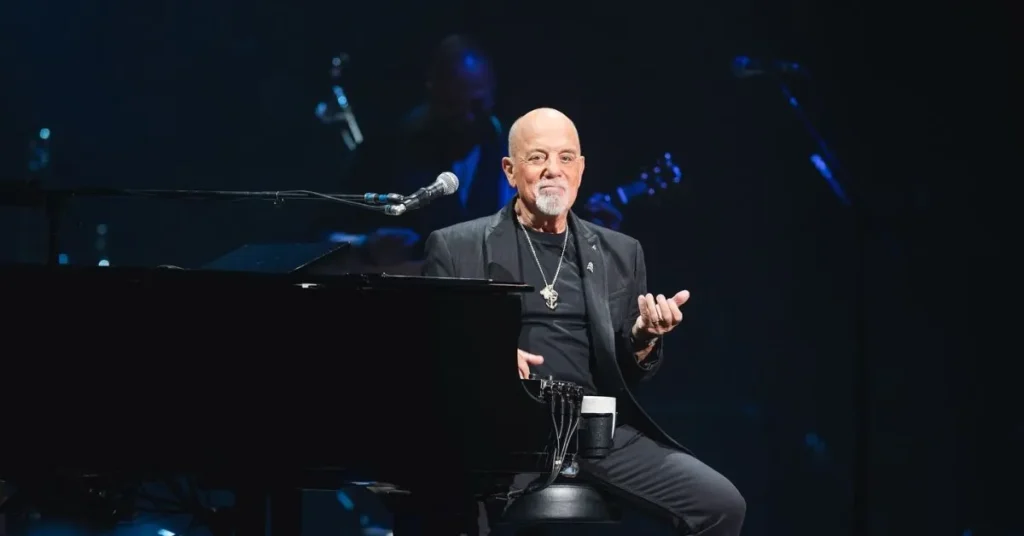In 2024, Billy Joel’s net worth stands at an impressive $250 million, largely built through his legendary Madison Square Garden residency and savvy business decisions. The Piano Man’s financial empire stems from his record-breaking performances, strategic real estate investments, and an enduring music catalog that continues to generate substantial revenue.
Beyond the glittering lights of Madison Square Garden, where he earns $2-3 million per show, William Martin Joel has crafted a diverse portfolio that cements his position among music’s financial elite. Let’s dive into how the boy from the Bronx transformed into one of the industry’s most successful artists.
Billy Joel Quick Bio
| Detail | Information |
| Full Name | William Martin Joel |
| Born | May 9, 1949 |
| Birthplace | The Bronx, New York City |
| Age (2024) | 75 years |
| Profession | Singer, Pianist, Songwriter |
| Years Active | 1964-Present |
| Education | Hicksville High School |
| Height | 5 feet 5 inches |
| Notable Albums | Piano Man, The Stranger, 52nd Street |
| Grammy Awards | 6 |
| Current Residence | Centre Island, New York |
What is the Net Worth of Billy Joel in 2024?
The Piano Man’s current net worth of $250 million reflects decades of smart financial decisions and consistent revenue streams. His Madison Square Garden residency alone has generated over $260 million since 2014, proving that his appeal remains as strong as ever.
While contemporaries like Elton John have pursued different paths, Joel’s focus on his New York home base has created a unique business model that continues to thrive. His monthly performances consistently sell out, demonstrating the enduring demand for his signature sound.
Finance Overview

Billy Joel’s financial empire spans multiple revenue streams, anchored by his historic Madison Square Garden residency. His $250 million net worth in 2024 stems from ingenious business decisions and diverse investments. Combining monthly MSG performances earning $2-3 million per show with strategic real estate holdings and robust music royalties, Joel has crafted a sustainable wealth-building model that continues to flourish decades into his career.
Financial Snapshot 2024
| Category | Value |
| Net Worth | $250 Million |
| MSG Show Revenue | $2-3 Million per show |
| Total MSG Revenue | $260+ Million (since 2014) |
| Albums Sold | 160+ Million |
| Annual Income (Est.) | $45-50 Million |
| Real Estate Portfolio | $40+ Million |
| Music Catalog Value | $100+ Million |
How He Built His Music Career and Achieved Financial Success
Joel’s journey to financial success began with his breakthrough album “Piano Man” in 1973. However, it was 1977’s “The Stranger” that catapulted him into superstardom. His partnership with Columbia Records proved instrumental in building his early wealth, setting the stage for decades of success.
The strategic decision to maintain control over his musical catalog has paid dividends, as his songs continue to generate substantial royalties through both traditional and modern streaming platforms. His ability to create timeless hits has ensured a steady income stream that transcends generations.
Revenue from His Long-Running Madison Square Garden Residency
Since establishing his monthly residency at Madison Square Garden in 2014, Joel has revolutionized the concept of sustained performance schedules. Each show consistently brings in between $2-3 million, creating a reliable revenue stream that has transformed the traditional touring model.
The residency’s success lies in its unique format – monthly shows that keep performances fresh while maintaining consistent demand. This innovative approach has allowed Joel to balance his professional commitments with personal life, all while building substantial wealth.
How His Music Catalog Sales Boosted His Finances
With over 160 million albums sold worldwide, Joel’s music catalog remains a powerhouse of passive income. Modern streaming platforms have given new life to classics like “Uptown Girl” and “Vienna,” introducing his music to younger generations while generating consistent revenue.
His publishing rights and licensing deals have proven particularly lucrative, with his songs regularly featured in films, television shows, and commercials. The decision to maintain control over his catalog has proven especially prescient in an era where music rights have become increasingly valuable.
Concert Tours and Performance Earnings Over the Years
Before his MSG residency, Joel’s touring career included historical moments like his groundbreaking 1987 Soviet Union concerts. His collaborations with Elton John particularly stood out, with their face-to-face tours becoming some of the most successful in concert history.
The evolution of his touring strategy shows remarkable business acumen. From early club performances to stadium tours, Joel has consistently adapted his approach to maximize both artistic impact and financial returns.
Real Estate Investments and Financial Management
Joel’s property portfolio reflects his shrewd investment strategy. His Sag Harbor estate stands as a crown jewel among his Long Island properties, while his Florida holdings demonstrate geographic diversification in his real estate investments.
His Oyster Bay compound particularly showcases his eye for valuable properties. These real estate investments have provided both personal havens and significant appreciation in value over the years.
Real Estate Portfolio

| Property | Location | Estimated Value |
| Centre Island Estate | Long Island, NY | $32 Million |
| Sag Harbor Home | The Hamptons, NY | $15 Million |
| Palm Beach Property | Florida | $22 Million |
| Oyster Bay Complex | Long Island, NY | $18 Million |
Awards, Recognition, and Their Impact on His Legacy and Earnings
Multiple Grammy Awards and induction into the Rock and Roll Hall of Fame have not only honored Joel’s artistic achievements but have also enhanced his brand value. These accolades have contributed to higher performance fees and increased demand for his music catalog.
Recognition from the industry has helped maintain Joel’s relevance across decades, ensuring his continued ability to command premium prices for performances and appearances.
Career Milestones & Awards
| Year | Achievement |
| 1973 | Release of “Piano Man” |
| 1977 | “The Stranger” becomes breakthrough album |
| 1978 | First Grammy Award |
| 1987 | Historic USSR Tour |
| 1992 | Rock and Roll Hall of Fame Induction |
| 1999 | Grammy Legend Award |
| 2014 | MSG Residency Begins |
| 2024 | 150th MSG Residency Show |
Financial Challenges and Recovery from Business Management Issues
Even music legends face setbacks, as evidenced by Joel’s legal battle with former manager Frank Weber over $30 million in mismanaged funds. This experience shaped his approach to financial management and led to more direct oversight of his business affairs.
His recovery from these challenges demonstrates remarkable resilience and business acumen, ultimately leading to stronger financial controls and better management practices.
Other Income Streams: Merchandising, Autobiography, and Collaborations
The success of his autobiography “The Book of Joel” showcases Joel’s ability to monetize his life story. Merchandising rights, brand partnerships, and strategic collaborations have created additional revenue streams beyond music.
His diverse portfolio of income sources helps maintain stable wealth growth while reducing dependence on any single revenue stream.
Social Media Presence 2024
| Platform | Handle |
| @billyjoel | |
| /billyjoel | |
| @billyjoel | |
| YouTube | Billy Joel |
| Spotify | Billy Joel |
The Business Evolution of a Music Icon

The transformation of Billy Joel from a Hicksville piano player to a financial powerhouse offers unique insights into music industry economics. His decision to limit touring while maximizing revenue through strategic venue selection has created a blueprint for veteran artists seeking sustainable career models.
Innovative Revenue Strategies
Columbia Records’ long-term partnership with Joel proved revolutionary in its structure. The deal allowed him unusual creative control while ensuring strong marketing support, leading to record-breaking sales of albums like “52nd Street.” This arrangement set new standards for artist contracts in the industry.
His performance scheduling strategy at Madison Square Garden incorporates sophisticated dynamic pricing models. By carefully timing ticket releases and adjusting prices based on demand, each show maximizes potential revenue while maintaining accessibility for core fans.
Investment Portfolio Diversification
Beyond his well-known real estate holdings, Joel has quietly invested in several New York restaurants and entertainment venues. These investments provide steady income streams while supporting the local entertainment industry he cherishes.
His boat-building business, started as a passion project, has evolved into a profitable venture. The 20th Century Cycles shop in Oyster Bay represents another successful divergence from traditional celebrity investments.
Digital Age Adaptation
Joel’s team has masterfully navigated the streaming era. Rather than resist digital transformation, they’ve leveraged platforms to introduce his catalog to new audiences. His music consistently ranks among the most-streamed artists of his generation, proving the timeless appeal of his work.
Philanthropic Impact
The Billy Joel Foundation, while less publicized than his commercial ventures, has made significant contributions to music education. This strategic philanthropy not only supports causes close to his heart but also enhances his brand value and cultural impact.
Legacy Planning and Asset Management
Recent years have seen Joel implement sophisticated estate planning strategies. His arrangement of music rights and property holdings ensures both family security and tax efficiency, demonstrating foresight in wealth preservation.
His partnership with Liberty Devitto and other long-term band members shows how maintaining positive professional relationships can prevent costly legal disputes while preserving artistic legacy.
Market Influence and Industry Impact
Joel’s MSG residency has influenced venue contracts industry-wide. The model has been studied and partially replicated by other artists, though few can match the sustained demand he generates in New York.
The secondary ticket market for his shows has created its own micro-economy. Brokers and resellers have built business models around his consistent performance schedule, further proving his market impact.
Future Growth Potential
Emerging opportunities in virtual reality concerts and digital memorabilia present new revenue streams. Joel’s team continues exploring innovative ways to monetize his extensive performance archive and memorabilia collection.
Recent licensing deals for biographical projects, including a potential documentary series, suggest untapped potential in his life story rights. These ventures could significantly impact his future net worth.
Read more: Bill Duker Net Worth, Wiki, Software Company, Wife, Age
Frequently Asked Questions
What makes the MSG residency so profitable?
The combination of consistent scheduling, premium pricing, and guaranteed sellouts creates a reliable revenue stream while minimizing touring costs.
How does Joel’s real estate portfolio contribute to his wealth?
Strategic property investments in locations like Long Island and Florida have appreciated significantly, providing both luxury living spaces and valuable assets.
What percentage of his wealth comes from music royalties?
While exact figures aren’t public, his extensive catalog continues to generate substantial passive income through streaming and licensing deals.
How has his financial management changed since the Weber lawsuit?
Joel now maintains closer oversight of his financial affairs and employs a more conservative approach to wealth management.
What’s the future outlook for Joel’s net worth?
With continuing MSG performances and strong catalog value, his wealth is likely to remain stable or grow, particularly as music rights become increasingly valuable.
Final Words
When you look at Billy Joel’s incredible journey to a $250 million net worth in 2024, it’s like watching a masterclass in turning passion into prosperity. The Piano Man didn’t just write amazing songs – he built an empire one piano key at a time.
His Madison Square Garden shows aren’t just concerts; they’re monthly gold mines, bringing in millions while letting him sleep in his own Long Island bed at night. Smart thinking, Billy!
From surviving financial setbacks to building a massive real estate portfolio, Joel shows us that true success isn’t just about making money – it’s about making smart choices. Whether he’s selling out MSG or collecting rent from his Florida properties, this Bronx-born musician proves that with talent, timing, and business sense, you can build a fortune that keeps on growing.
Now that’s what we call a perfect harmony of art and business!




